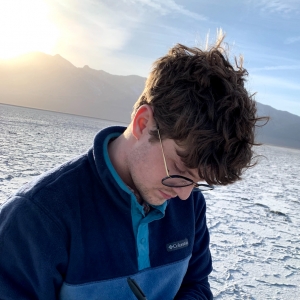2021 Doyle W. Stephens Scholarship Winner
Brigham Young University
Bio:
Colin Robinson is a senior in the Molecular Biology Department at Brigham Young University. His research interests lie in the fields of conservation, microbial bioremediation, and astrobiology. For 4 years, he has worked as a research assistant in Byron Adam’s laboratory at BYU where he has maintained populations of Antarctic nematodes for a long term forced evolution experiment, extracted perchlorate-reducing microbes from soils he collected in Pilot Valley, Utah, tested the effect of those microbes on aiding plant growth in simulated Mars conditions, attempted to resurrect a thousand-year-old Antarctic algal mat, and studied the effects of temperature on the metabolic activity and microbiome of a mesophilic Antarctic nematode called Plectus murrayi. He plans to pursue a Master’s Degree in Biology at BYU starting in September 2022 where he will continue his research of perchlorate-reducing microbes, their potential martian analogues, and the metabolic pathway of perchlorate reduction. He then plans to pursue a Ph.D. in astrobiology.
Title: Alien-Like Microbes Found in the Desert of Great Salt Lake
Abstract: The Pilot Valley Basin of the Desert of the Great Salt Lake is a Mars analog in that it has soil rich in naturally occurring perchlorate (ClO4-), a toxic anion that seems to prevent all plant seed germination. Microbially induced sedimentary structures in the salt flats of the Pilot Valley have been shown to contain perchlorate-reducing microbes, which, in anaerobic conditions, remove perchlorate from the soil by using it to produce oxygen for metabolism. Mars, like the Pilot Valley, has high levels of perchlorate in its soil and is depleted of oxygen. It stands to reason that if life exists on the Red Planet, it may be similar to these microbes. To further understand how life may exist on Mars, we isolated bacteria from microbially induced sedimentary structures in the Pilot Valley of the Desert of the Great Salt Lake and analyzed their ability to digest perchlorate. Two perchlorate reducing microbes were isolated, analyzed, and characterized as novel strains of Bacillus pumilus and Bacillus subterraneus. These organisms represent the first known perchlorate-reducing organisms isolated from soil containing naturally occurring perchlorate. Genes required for perchlorate reduction, such as the perchlorate reductase alpha subunit (PcrA) and chlorite dismutase (Cld) genes, have previously been shown to be present in eDNA extracted from Pilot Valley sediment. Only PcrA, however, was present in the two characterized perchlorate reducing strains. This is indicative of community based perchlorate reduction in the Pilot Valley. Furthermore, both strains were shown to marginally increase rates of plant seed germination and plant growth in Mars regolith simulant, showing that these microbes could be used as a soil treatment to enhance potential agriculture on a mission to Mars.

